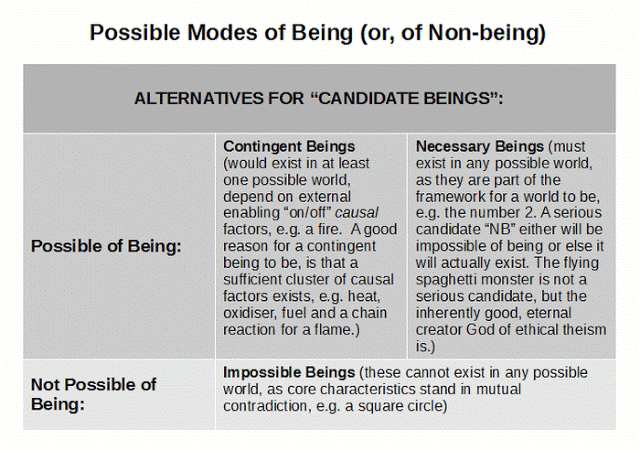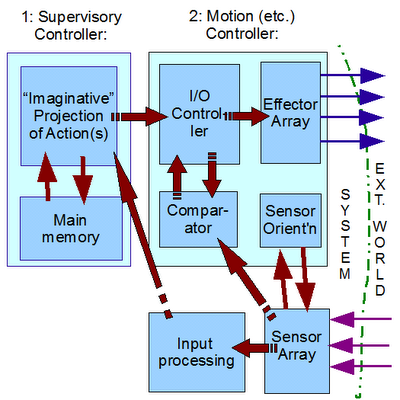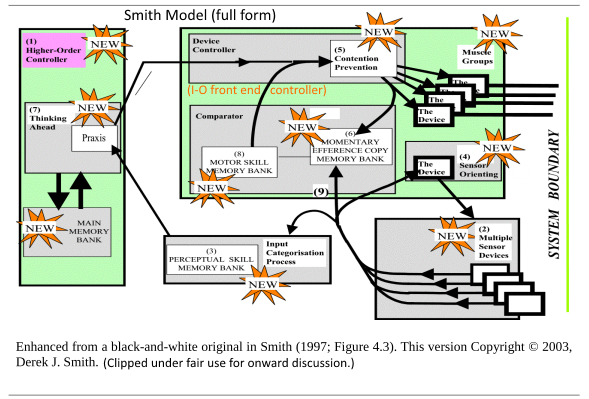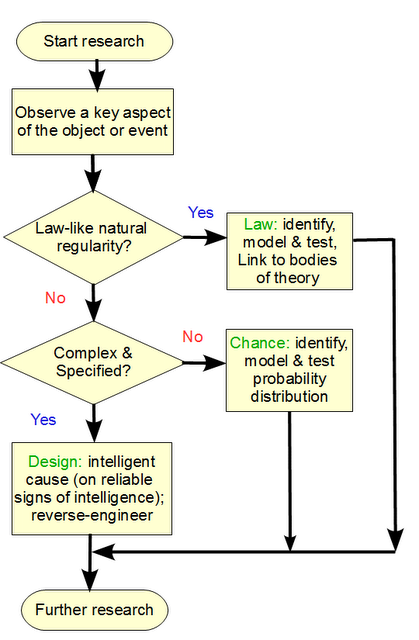After we headlined and began discussing PS on hearing and consciousness yesterday, H raised a significant issue:
H, 15: >> . . . the invocation of a Creator who “beautifully designed what each sound should sound like” and “put the special program that can interpret each frequency pattern of air vibration into each sound, thus giving us the sound experience” is an empty explanation, no more useful than claiming that mind arises from matter without any idea how that could happen. >>
To this, I replied:
KF, 16: >> The concept that the root of reality is Mind, and that mind is at least as fundamental as matter is not an empty claim or assertion. That intelligent, minded designers exist is a fact, your own comment is a case in point. Further to this, the only actually observed material cosmos is arguably contingent, thus not the source of reality. However, it shows strong signs of design, which points to design and raises the onward question of a designer of a cosmos. Where, too, once something now is — a world — something that is necessary of being always was; as circular creation and origin from non-being are non-starters. Matter is not a credible candidate as it is composite. Mind, ultimate mind, is a serious candidate; such would either turn out to be impossible of being (similar to a square circle) or would be actual. So, reasons why an ultimate mind is impossible of being are: _______ ? [I suspect, this will be very hard to fill in!] >>
This puts on the table the question of the logic of ultimate, necessary being Mind as root of reality.
First, a reminder on basic logic of being:

In this light, the claim at issue would be that reality credibly comes from an ultimate, necessary being Mind, so that Mind is a root-level category of existing entities. Thus, explanation on intent of a capable mind would be a reasonable explanation, even if we may not know details of techniques or processes.
So also, on identifying that there are recognisable, empirically tested, reliable signs of design — i.e. intelligently directed configuration — we have good reason to infer to Mind at work. As, from our world of experience, we are minded and create designs which bear hallmarks of design. This, of course, is pointing to the scientific legitimacy as well as the broader significance of the design inference on signs. And, at this stage, I think the balance on merits and track record of fallacious selective hyperskepticism on the part of ever so many objectors leads me to simply state the result. We do not exhaust possible designers, something that the mere existence of a thriving Sci Fi literature documents, not to mention the searches for extra-terrestrial intelligence.
The issue is ultimate mind, not mind and not whether minds may — or often do — leave empirically recognisable, reliable traces behind; that is obvious. It takes mind, just to be able to be aware of this OP then read and discuss it, and in so doing we mutually recognise other minds at work . . . even behind sock puppets etc.
Mind is real, the instant question is, how is it distinct from things like computation on a substrate. In response, I have put up Eng Derek Smith’s two-tier cybernetic control loop model, with a supervisory controller interacting with the one that is in the loop:

In more details:

Here, the question would be, what would be a suitable interface to the neural networks? A suggestion has been, quantum influence on the radical contingency of possibilities at that level. We do not need to know more for present purposes, though obviously onward work is helpful. The issue is, without top-down intent, materially driven bottom-up causation undermines responsible rational freedom (so, mindedness) by reducing it to GIGO-driven computation on blind chance and/or mechanical necessity with of course a big lurking question being, where did such complex functionally coherent information-rich design come from, apart from design?
Thus also, we can see why the explanatory filter approach is helpful i/l/o the observed trichotomy of causal factors, mechanical, law-like necessity, chance, design:

Indeed, we see here that it is arguable that what the filter is doing is identifying plausible cases of purposeful, intelligently directing mind having been at work.
Further, as matter is composite and/or diverse and/or contingent (even with elementary particles, we have a bit of a “zoo”), it is not a good candidate to be ultimate reality. Building blocks for our world, yes, ultimate reality, no. We need something that gets us to a unified, ordered system of reality.
Ultimate, necessary being Mind is on the table as a serious candidate i/l/o fine tuning of the observed cosmos and of the coherent, intricately functional complexity of cell based life in it. Where, on the logic of being, a serious candidate necessary being is either impossible of being or else actual.
This means, is the dominant evolutionary materialistic scientism of our day overly simplistic, locking out a reasonable category of being and clinging to absurdity? The case of Rosenberg seems to pose an Exhibit a:
Alex Rosenberg as he begins Ch 9 of his The Atheist’s Guide to Reality:
>> FOR SOLID EVOLUTIONARY REASONS, WE’VE BEEN tricked into looking at life from the inside. Without scientism, we look at life from the inside, from the first-person POV (OMG, you don’t know what a POV is?—a “point of view”). The first person is the subject, the audience, the viewer of subjective experience, the self in the mind.Scientism shows that the first-person POV is an illusion. [–> grand delusion is let loose in utter self referential incoherence] Even after scientism convinces us, we’ll continue to stick with the first person. But at least we’ll know that it’s another illusion of introspection and we’ll stop taking it seriously. We’ll give up all the answers to the persistent questions about free will, the self, the soul, and the meaning of life that the illusion generates [–> bye bye to responsible, rational freedom on these presuppositions].
The physical facts fix all the facts. [–> asserts materialism, leading to . . . ] The mind is the brain. It has to be physical and it can’t be anything else, since thinking, feeling, and perceiving are physical process—in particular, input/output processes—going on in the brain. We [–> at this point, what “we,” apart from “we delusions”?] can be sure of a great deal about how the brain works because the physical facts fix all the facts about the brain. The fact that the mind is the brain guarantees that there is no free will. It rules out any purposes or designs organizing our actions or our lives [–> thus rational thought and responsible freedom]. It excludes the very possibility of enduring persons, selves, or souls that exist after death or for that matter while we live.>>
So, now, it seems that Ultimate, Necessary Being Mind is on the table as a serious candidate to be root of reality. The next question is, is such credibly impossible of being? If that cannot be responsibly shown, then there is very good reason to hold that such a Mind is actual, and to accept that other minds such as our own reflect a similar character and capability to supervene on and influence or control material realities, starting with our bodies. For instance, just to type comments.
Is reality best explained on necessary being, ultimate mind? Let us ponder together. END